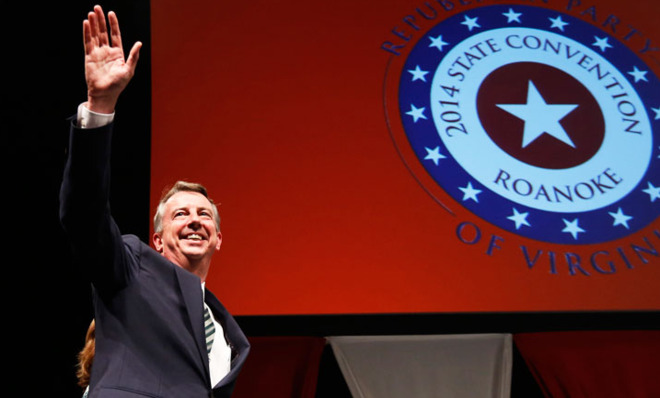The most sensible GOP alternative to ObamaCare comes from a Senate candidate who is almost sure to lose
Ed Gillespie, the former chairman of the Republican National Committee, has transformed himself into a conservative wonk


Consider this sentence: "Former Republican National Committee Chairman Ed Gillespie takes the political risk of championing a middle-class-friendly, comprehensive health-care reform as an alternative to President Obama's Affordable Care Act." Think on it for a bit. It has all the plausibility of saying, "A kazoo will become self-aware and compose symphonies." And yet, it has happened.
The polls tell us that Gillespie does not look likely to be a member of the Senate come November. But if Republicans fear that ObamaCare will result in a federal government that demands an ever-larger share of the GDP, and a health-care system that acts as an automatic ceiling on the GOP's electoral support forever, then the party should consider dropping the Ted Cruz line of "repeal and replace with [TBD]" and replace it with something like Gillespie's reforms.
The reform is based on the 2017 project, and is relatively simple. The ACA's individual mandate and the health-care exchanges go away. Instead, the government gives a tax credit (that grows depending on age) to anyone who does not receive health benefits from an employer. Young adults would get a smaller tax credit, and it would increase every decade and with every dependent child. A tax credit has the benefit of being progressive in effect, since for those with little income the credit would constitute a larger share of their overall income. It would make relatively little difference to those making bank.
The Week
Escape your echo chamber. Get the facts behind the news, plus analysis from multiple perspectives.

Sign up for The Week's Free Newsletters
From our morning news briefing to a weekly Good News Newsletter, get the best of The Week delivered directly to your inbox.
From our morning news briefing to a weekly Good News Newsletter, get the best of The Week delivered directly to your inbox.
There are other little tweaks on the edges, including making $75 billion available for states to run high-risk insurance pools. And there are measures to make sure that people with pre-existing conditions can purchase health-care insurance, and that insurance companies are prevented from simply dropping them.
But the centerpiece of the plan is the creation of a 50-state health-insurance market, long the dream of conservative health-care reformers. Private insurance companies are still required to make their product work in 50 different regulatory environments, and this does not make for a healthy, diverse market.
One of the side effects of a Gillespiecare-style health reform would be a much more robust market for catastrophic insurance plans, which allow people to manage their health care in the same way most people manage insurance costs in other areas of life. Regular care could be purchased on a per item basis, and the really dangerous stuff — hospital stays, emergency-room visits (for actual emergencies), and other health disasters — could be covered by insurance.
Because health insurance is now a regulatory game of creating the illusion of "free" health-care items to some constituents, while allowing all the opacity and third-party chicanery that enables profiteering from medical businesses, America pays the most for its health care while receiving the least in return per dollar. It also has the most mind-numbing, ulcer-producing paperwork related to it. The Affordable Care Act actually did little to alter the incentives of the system, but tried to address it by plugging up a few holes.
A free daily email with the biggest news stories of the day – and the best features from TheWeek.com
What the Republicans really need is a health-care reform plan that untangles health care from employment for good. Employment-based health care may scare a few people into getting or keeping jobs that they are suited for, but it's overall effect is job lock, an insane-pricing scheme, and a net drag on innovation. Gillespiecare is a modest and (if pursued soon) achievable step in the right direction. It evens the playing field between employer-provided and individually purchased health insurance.
Ed Gillespie has tried to sell Republicans on the politics of a plan like this, arguing "we must present an alternative that is both practically effective and politically viable."
It is the unlikeliest of events, but Gillespie has stepped out and offered a reasonable and nonradical approach to controlling health-care costs and getting more people health-insurance policies without the ACA's most unpopular features. Republicans would be wise to follow the lead.
Michael Brendan Dougherty is senior correspondent at TheWeek.com. He is the founder and editor of The Slurve, a newsletter about baseball. His work has appeared in The New York Times Magazine, ESPN Magazine, Slate and The American Conservative.
-
 What is at stake for Starmer in China
What is at stake for Starmer in ChinaToday’s Big Question The British PM will have to ‘play it tough’ to achieve ‘substantive’ outcomes, while China looks to draw Britain away from US influence
-
 How the ‘British FBI’ will work
How the ‘British FBI’ will workThe Explainer New National Police Service to focus on fighting terrorism, fraud and organised crime, freeing up local forces to tackle everyday offences
-
 The best family hotels in Europe
The best family hotels in EuropeThe Week Recommends Top kid-friendly hotels with clubs, crèches and fun activities for children of all ages – and some downtime for the grown-ups
-
 The billionaires’ wealth tax: a catastrophe for California?
The billionaires’ wealth tax: a catastrophe for California?Talking Point Peter Thiel and Larry Page preparing to change state residency
-
 Bari Weiss’ ‘60 Minutes’ scandal is about more than one report
Bari Weiss’ ‘60 Minutes’ scandal is about more than one reportIN THE SPOTLIGHT By blocking an approved segment on a controversial prison holding US deportees in El Salvador, the editor-in-chief of CBS News has become the main story
-
 Has Zohran Mamdani shown the Democrats how to win again?
Has Zohran Mamdani shown the Democrats how to win again?Today’s Big Question New York City mayoral election touted as victory for left-wing populists but moderate centrist wins elsewhere present more complex path for Democratic Party
-
 Millions turn out for anti-Trump ‘No Kings’ rallies
Millions turn out for anti-Trump ‘No Kings’ ralliesSpeed Read An estimated 7 million people participated, 2 million more than at the first ‘No Kings’ protest in June
-
 Ghislaine Maxwell: angling for a Trump pardon
Ghislaine Maxwell: angling for a Trump pardonTalking Point Convicted sex trafficker's testimony could shed new light on president's links to Jeffrey Epstein
-
 The last words and final moments of 40 presidents
The last words and final moments of 40 presidentsThe Explainer Some are eloquent quotes worthy of the holders of the highest office in the nation, and others... aren't
-
 The JFK files: the truth at last?
The JFK files: the truth at last?In The Spotlight More than 64,000 previously classified documents relating the 1963 assassination of John F. Kennedy have been released by the Trump administration
-
 'Seriously, not literally': how should the world take Donald Trump?
'Seriously, not literally': how should the world take Donald Trump?Today's big question White House rhetoric and reality look likely to become increasingly blurred
